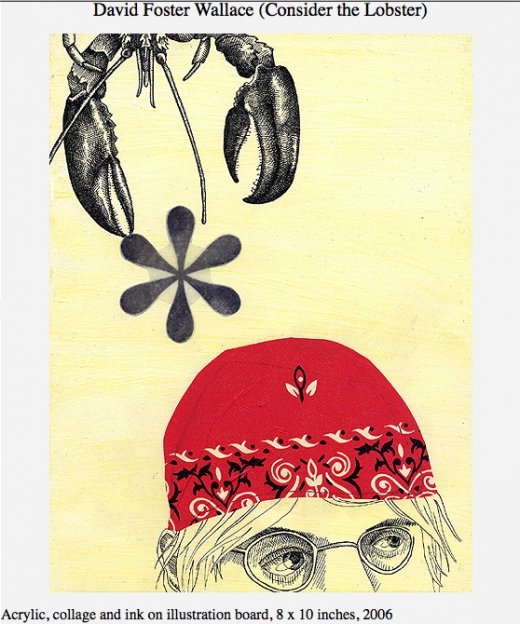
[Illustration by SARAHATLEE]
A.O. SCOTT: What’s true of writers’ lives is also, surely, true of their deaths. The temptation to regard Mr. Wallace’s suicide last weekend as anything other than a private tragedy must be resisted. But the strength of the temptation should nonetheless be acknowledged. […] The moods that Mr. Wallace distilled so vividly on the page — the gradations of sadness and madness embedded in the obsessive, recursive, exhausting prose style that characterized both his journalism and his fiction — crystallized an unhappy collective consciousness. And it came through most vividly in his voice. Hyperarticulate, plaintive, self-mocking, diffident, overbearing, needy, ironical, almost pathologically self-aware (and nearly impossible to quote in increments smaller than a thousand words) — it was something you instantly recognized even hearing it for the first time. It was — is — the voice in your own head.
Or mine, at any rate. When, as an undergraduate with a head full of literary theory and a heartsick longing for  authenticity, I first encountered David Foster Wallace, I experienced what is commonly called the shock of recognition. Actually, shock is too clean, too safe a word for my uncomfortable sense that not only did I know this guy, but he knew me. He could have been a T.A. in one of my college courses, or the slightly older guy in Advanced Approaches to Interpretation who sat slightly aloof from the others and had not only mastered the abstruse and trendy texts everyone else was reading, but also skipped backward, sideways and ahead. It was impressive enough that he could do philosophy — the mathematical kind, not just the French kind. But he also played tennis — Mr. Wallace, in fact, had competed seriously in the sport — and could quote lyrics from bands you only pretended you’d heard of. Without even trying, he was cooler than everyone else.
authenticity, I first encountered David Foster Wallace, I experienced what is commonly called the shock of recognition. Actually, shock is too clean, too safe a word for my uncomfortable sense that not only did I know this guy, but he knew me. He could have been a T.A. in one of my college courses, or the slightly older guy in Advanced Approaches to Interpretation who sat slightly aloof from the others and had not only mastered the abstruse and trendy texts everyone else was reading, but also skipped backward, sideways and ahead. It was impressive enough that he could do philosophy — the mathematical kind, not just the French kind. But he also played tennis — Mr. Wallace, in fact, had competed seriously in the sport — and could quote lyrics from bands you only pretended you’d heard of. Without even trying, he was cooler than everyone else.
All this shone through Mr. Wallace’s fiction. He had the intellectual moves and literary tricks diagrammed in advance: the raised-eyebrow, mock-earnest references to old TV shows and comic books; the acknowledgment that truth was a language game. He was smarter than anyone else, but also poignantly aware that being smart didn’t necessarily get you very far, and that the most visible manifestations of smartness — wide erudition, mastery of trivia, rhetorical facility, love of argument for its own sake — could leave you feeling empty, baffled and dumb. Another way of saying this is that Mr. Wallace, born in 1962 and the author of an acclaimed first novel at age 24, anchored his work in an acute sense of generational crisis. None of his peers were preoccupied so explicitly with how it felt to arrive on the scene as a young, male American novelist dreaming of glory, late in the 20th century and haunted by a ridiculous, poignant question: what if it’s too late? MORE
